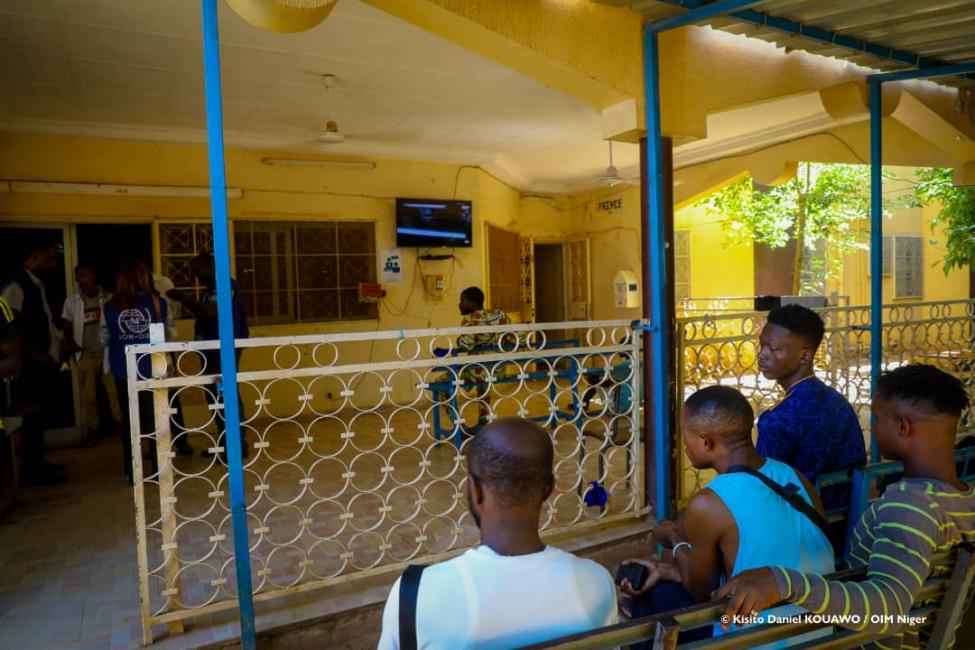-
Who we are
WHO WE AREThe International Organization for Migration (IOM) is part of the United Nations System as the leading inter-governmental organization promoting since 1951 humane and orderly migration for the benefit of all, with 175 member states and a presence in 171 countries.
-
Our Work
Our WorkAs the leading inter-governmental organization promoting since 1951 humane and orderly migration, IOM plays a key role to support the achievement of the 2030 Agenda through different areas of intervention that connect both humanitarian assistance and sustainable development.
What We Do
What We Do
Partnerships
Partnerships
- Where we work
-
Take Action
Take Action
Work with us
Work with us
Get involved
Get involved
- Data and Research
- 2030 Agenda
Alarming Overcrowding in Niger Migrant Transit Centres Calls for Urgent Action: IOM
Geneva – The International Organization for Migration (IOM) is calling for the establishment of an urgent humanitarian corridor out of Niger for stranded migrants to ease the overcrowding in its centres, where thousands of migrants are hosted, with many awaiting to return home.
The recent border and airspace closures have compounded the challenges faced by stranded migrants and impeded IOM’s assisted voluntary return operations, with all flights either postponed or cancelled for the time being. In ten days, multiple departures meant to facilitate the voluntary return of over 1,000 migrants, primarily from Mali and the Republic of Guinea, were cancelled or postponed.
Concerns continue to grow as numbers of stranded migrants in need of assistance increase, with around 1,800 migrants awaiting assistance outside IOM transit centres while necessary capacity and resources diminish to host new migrants in the centres.
The Organization is currently hosting around 5,000 migrants in seven transit centers strategically positioned along migration routes – four in the Agadez region and three in the Niamey region, where it provides urgent humanitarian assistance including accommodation, food, healthcare, and voluntary return to the countries of origin. At present, the capacity of these centres is overwhelmed with hundreds of migrants awaiting assistance outside.
In recent weeks, IOM has been unwavering in its support to host communities along migration routes in Niger via its Community Stabilization Programme in the Agadez region. This initiative bolsters economic resilience within communities, with a specific focus on women and youth, while also nurturing social cohesion between host and migrant communities. At least 1,200 women have been provided with livelihood support to promote local craftsmanship, income-generating activities, and enhance their socio-economic empowerment. Additionally, medical equipment has been supplied to community health facilities in seven out of the 16 municipalities in the Agadez region to improve healthcare access for both host populations and migrants.
Niger holds a unique position as a country of origin, transit and destination for intraregional migration movements. The 5,697-kilometer borders shared with six neighbouring states put the country at the centre of most migratory routes in the region.
In the first half of 2023, more than 60,000 migrants travelled through Niger, encompassing diverse profiles, including migrant workers and unaccompanied migrant children.
IOM remains committed to providing essential services to migrants in its centres, however, the current extreme overcrowding raises the alarm over the health and safety of migrants and the Organization’s ability to deliver lifesaving assistance.
***
For more information please contact:
In Geneva:
Safa Msehli; smsehli@iom.int; +41794035526.
Kennedy Okoth; kokoth@iom.int ; +41227179702
In Dakar:
Joelle Furrer; jfurrer@iom.int; +221784433253
